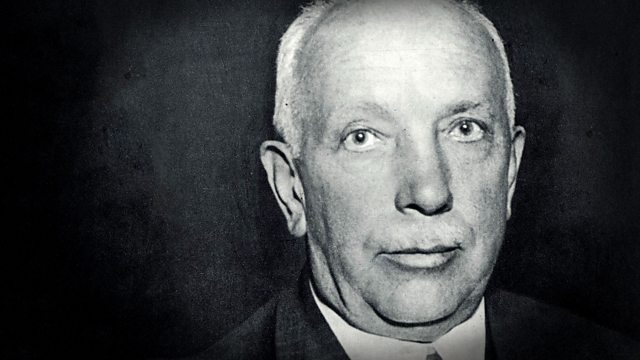
Strauss 150: Die agyptische Helena
John Shea introduces Strauss's 1927 opera Die agyptische Helena, a fanciful interpretation of an ancient Greek myth featuring love, jealousy and reconciliation.
Richard Strauss's 1927 Die ägyptische Helena, replete with Straussian vocal plums and uncluttered, limpid textures has been called Strauss's 'bel canto' opera. But its plot, implausible and silly even by opera's standards, has prevented it from entering the repertoire.
The sorceress Aithra (owner of a handy Omniscient Seashell), conjures up a storm to bring Helen of Troy and her jealous husband Menelaus to her Mediterranean island. Her purpose? To effect a reconciliation between Menelaus and Helen by means of a magic Forgetfulness potion. If Menelaus can forget Helen's long infidelity with Paris (and, one presumes, the small matter of the Trojan War), then love will reign between them once more. Should be simple. But what's this? Instead of the Forgetfulness potion, a Recollection potion has been packed in the picnic hamper by mistake. Whoops. Add in some picnic-disrupting desert warriors (among whom there's a dashing prince who inevitably falls for Helen), a troupe of elves and, at last, the hoped for reconciliation between Helen and Menelaus and you know all you need.
Presented by John Shea and including a downloadable Opera Guide, exploring the background and reception of the opera.
Helena.....Gwyneth Jones (soprano)
Menelaus.....Matti Kastu (tenor)
Hermione.....Dinah Bryant (soprano)
Aithra.....Barbara Hendricks (soprano)
Altair.....Willard White (bass)
Die alles-wissende Muschel.....Birgit Finnila (mezzo-soprano)
Da-Ud.....Curtis Rayam (tenor)
The Kenneth Jewell Chorale
Detroit Symphony Orchestra
Antal Dorati (conductor).
Last on
More episodes
Synopsis
��
ACT I. The mythological past. In her island palace, the sorceress Aithra waits in vain for Poseidon’s return. The oracle-like Omniscient Mussel tells her that though Poseidon is far away, he remains steadfast in his love for her. The Mussel then tells of a ship on which the most beautiful woman in the world, Helena (Helen of Troy), is about to be murdered by her husband, Menelas (Menelaus). To save the woman, Aithra conjures a flash storm to shipwreck the passengers, who soon make their way ashore and appear at the palace. Helena has been trying to save her marriage, but Menelas cannot forgive her for her betrayal with Paris at the start of the Trojan War. Bitterly, he has prevented their daughter, Hermione, from knowing her own mother. On land, Menelas once again plans to stab his wife, but the sight of her beauty by moonlight makes him hesitate. To ensure that he doesn’t kill her, Aithra invokes elves to torment him; they make him believe that his rival, Paris, is present, and he rushes out to confront the specter. Aithra’s magic then helps Helena regain her original youthful beauty, and a lotus drink banishes her anxiety. Servant girls take her to another room.
When Menelas stumbles back in, raving about having surprised and killed Helena and Paris, Aithra gives him the soothing drink as well. Hearing of his conflicted emotions toward his wife, the sorceress tries to tell him that nine years before, when he lost Helena to Paris, the gods actually substituted a wraith to fool Paris; the real Helena was hidden in the castle of Aithra’s father on the slopes of the Atlas Mountains. There she remains, asleep, waiting for her husband to wake her; the woman in the next room is the wraith. Aithra pledges to transport Menelas by magic to the castle. Bewildered and hesitant, he gradually yields to the notion that the original Helena will be restored to him. In a pavilion at the foot of the mountain, the two can be reunited. Aithra suggests he use the lotus potion to keep disturbing memories at bay
ACT II. In the pavilion, Helena awakens and hails the couple’s second wedding night (“Zweite Brautnacht”). Menelas, also awakening, still mistrusts his senses. His wife tries to soothe him with more lotus juice, but he catches sight of his sword, which revives jarring memories. Is this woman real or an illusion? Desert horsemen appear, and Altair, prince of the mountains, bows before Helena, offering gifts; his son Da-ud joins in praising her beauty. The scene reminds Menelas of a Trojan celebration in honor of Helena, but he tries to conceal his jealousy as Altair and Da-ud invite him to join a hunting party. Bidding farewell to Helena, and still uncertain of her identity, he leaves for the hunt. Aithra appears as one of the serving girls and cautions Helena that one of the vials she has packed contains a potion of forgetfulness but the other a potion of recollection. Against Aithra’s strong advice Helena declares that recollection will be necessary to save her marriage; the fantasy of returning to an unblemished past is not a genuine solution.
At a sign from Helena, the maidservants withdraw when Altair returns, paying bold court to her and inviting her to a banquet in her honor. Even when word arrives that Menelas has killed Da-ud during the hunt, Altair continues his suit. He steps away, though, when the youth’s body is brought in, followed by Menelas, who remains confused, thinking it is Paris he has killed. Again defying Aithra’s counsel, Helena orders the potion of recollection prepared as time for the feast draws near. Menelas now imagines that the real Helena has died, and he resolves to join her in death; the Helena before him is surely the wraith. When he takes what he thinks is the potion of death, however, he sees the dead Helena as the living one: both are united. Altair and his cohorts seize and separate the couple, but Aithra reveals a phalanx of Poseidon’s soldiers, who are escorting the child Hermione. Recognizing Aithra the sorceress, Altair bows to her power. Hermione, reunited at last with her parents, will go home with them to begin their life together.
Broadcast
- Mon 3 Nov 2014 19:3091�ȱ� Radio 3
